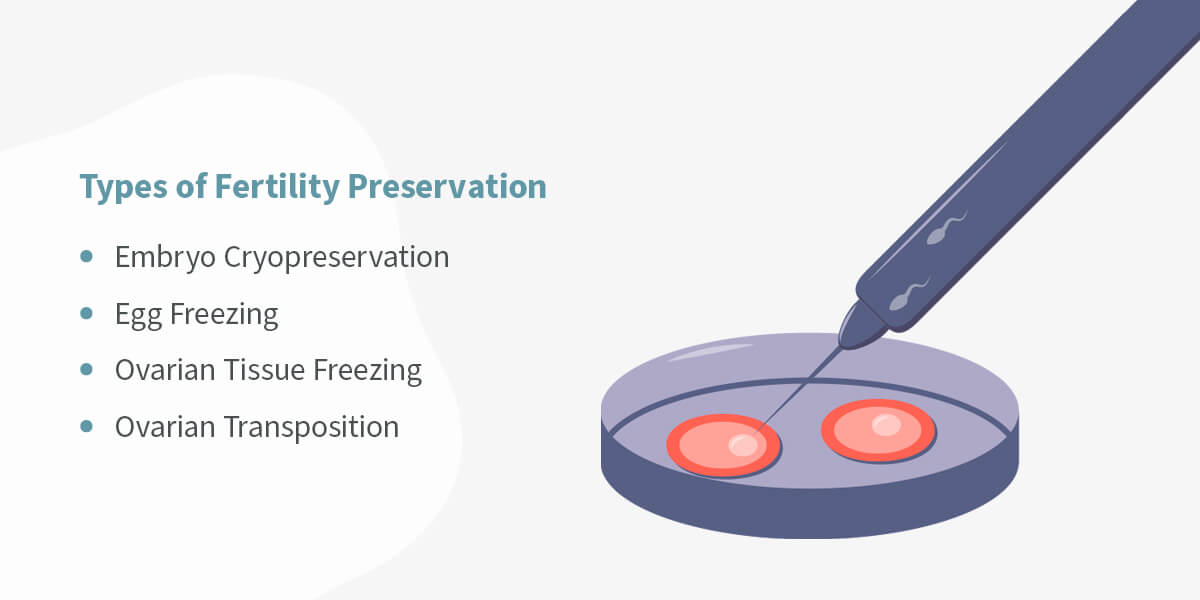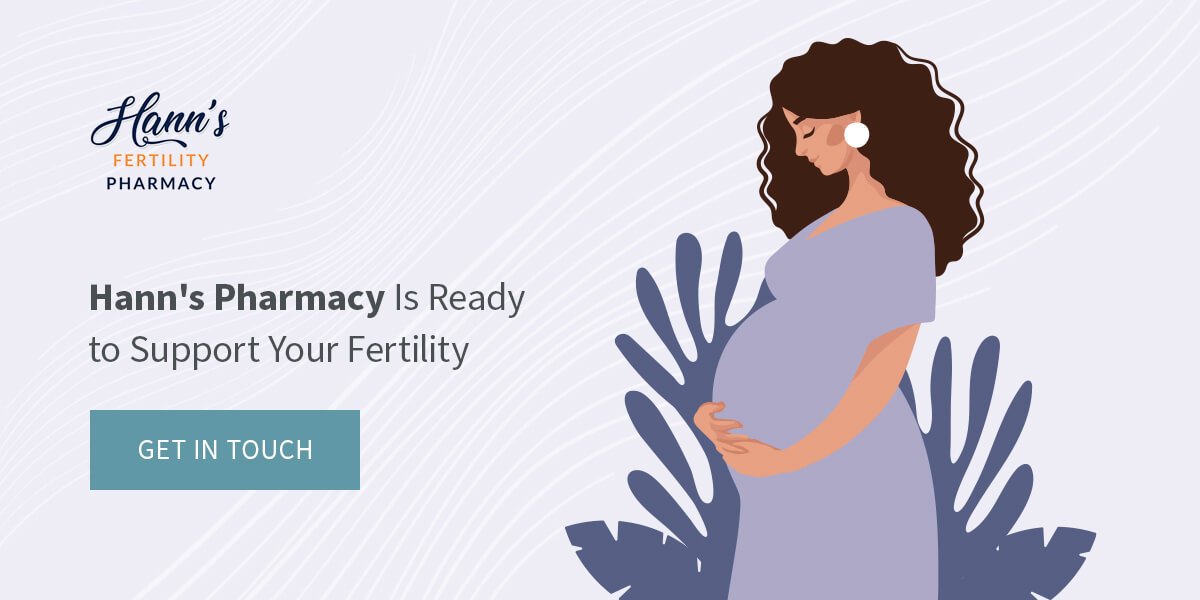Receiving a cancer diagnosis can be overwhelming and life-changing, and for many women, it can also raise concerns about fertility and the ability to have children in the future. Cancer treatments such as chemotherapy, radiation therapy and surgery can significantly impact the reproductive system, potentially leading to infertility or early menopause. However, advanced techniques allow women with cancer to safeguard their fertility and increase their chances of successful pregnancy after treatment.
Join us here to learn about the various fertility preservation options available to women with cancer, including embryo freezing, egg freezing, ovarian tissue freezing, ovarian transposition and more.
What Is Fertility Preservation?
Fertility preservation is a way to save eggs, sperm or embryos for future use so women can have biological children. Fertility preservation can be an excellent choice for women facing childbearing challenges due to medical treatments like chemotherapy or radiation therapy or for those who want to put off having children for personal or professional reasons.
Types of Fertility Preservation

Talk with your doctor about which of these fertility treatments for cancer patients may be best for you.
Embryo Cryopreservation
It’s possible to freeze and store embryos for future use in assisted reproductive technologies such as in vitro fertilization. The process involves fertilizing eggs with sperm in a laboratory. Once the embryos have formed, the lab stores them in liquid nitrogen at below-freezing temperatures until your family is ready to use them.
Embryo freezing is a popular option for women undergoing IVF with extra embryos that they don’t immediately use. A couple can store frozen embryos for later use if the first IVF cycle is unsuccessful or they want more children in the coming years.
Egg Freezing
Egg cryopreservation involves harvesting, freezing and storing eggs until you are ready to use them.
To start the egg-freezing process, you take hormones to stimulate egg production. A doctor removes the eggs using a needle and ultrasound guidance in a process known as egg retrieval. Freezing extracted eggs with a process called vitrification rapidly cools them to prevent damaging ice crystal formation.
Ovarian Tissue Freezing
Ovarian tissue freezing is a surgical procedure to remove a small piece of ovarian tissue containing immature eggs. Cryopreservation prevents cell damage.
When you are ready to use the tissue, the lab will thaw it for reimplantation into your body. The reimplanted tissue can produce mature eggs for fertilization via IVF or other assisted reproductive technologies.
Ovarian tissue freezing is a relatively new technique whose success rates are still under study. However, it’s a promising option for women who want to preserve their fertility in the hopes of a healthy future pregnancy.
Ovarian Transposition
Ovarian transposition is a surgical procedure for women receiving radiation for pelvic cancer. This oncofertility treatment involves moving the ovaries out of the field of radiation, protecting them from damage.
During ovarian transposition, the surgeon relocates the ovaries to a higher position in the abdomen, using sutures or other techniques to secure them. Depending on your unique circumstances, you can have ovarian transposition through an open surgery or laparoscopic procedure.
Ovarian transposition is safe and effective for women undergoing radiation therapy for cancer treatment to protect their fertility. Studies have shown that the procedure can help preserve ovarian function and increase the chances of carrying a pregnancy after cancer treatment. However, the procedure’s success depends on many factors, including your age, the type and dose of radiation therapy and the extent of the cancer treatment.
Additional Options for Women Who Are Infertile After Cancer Treatment
If becoming infertile after cancer treatment is a concern, don’t worry — you still have options.
Donor Eggs
If your uterus is healthy and your doctor has cleared you for pregnancy, but you can’t conceive with your eggs, using donor eggs is an option. This process requires IVF to collect the eggs.
In the U.S., donors can be public or unknown, compensated or not. You may even have a family member or friend who wants to share their eggs for free. Frozen egg banks are also available for women to purchase eggs for IVF.
To ensure safety, egg donors get tested for sexually transmitted diseases and genetic disorders. They also undergo a mental health evaluation. Known donors must establish whether they’ll interact with the child and affirm they did not donate the eggs under pressure.
The egg donation’s success depends on strategically timed hormone therapy to prepare your uterus lining for embryo placement. A doctor will retrieve eggs from the donor and unite them with the sperm, then implant the resulting embryos into your body to initiate pregnancy. Hormone support may be necessary until the placenta can make hormones on its own.
Donor Embryos
If you have a viable uterus and can sustain a pregnancy, you may choose to undergo IVF with donated embryos. While neither parent will have a biological link to the child, using donor embryos allows you and your partner to experience pregnancy and birth together.
One issue with this option is that the embryo donors may want to pursue the same genetic testing typically done for egg or sperm donors or provide a comprehensive health history. However, the embryos are usually free, so you will only be financially responsible for preparing your uterus for embryo transfer and placement, plus any related medical and legal fees.
Most women need hormone therapy to prepare the uterus lining and ensure the best timing of the embryo transfer. If you choose this option, you must be able to take hormones safely.
Adoption
Adoption may be available for single parents or couples who want children. Many adoption centers and foster care organizations welcome cancer survivors as parental candidates. Still, they may want you to have completed treatment and answer questions about your cancer and quality of life.
Adopting a child involves significant paperwork, which can be overwhelming. Attending adoption or new parent classes beforehand can help familiarize you with the journey and connect you with others in similar situations.
Mentally prepare that your adoption process may vary significantly in length and cost. Though some discrimination may occur, most cancer survivors who wish to adopt can.
Hann’s Pharmacy Is Ready to Support Your Fertility
Fertility preservation can provide hope and peace of mind for women with cancer who want to start or expand their families. With advancements in technology and many options available, women can take control of their reproductive health and preserve their fertility before undergoing cancer treatment.
At Hann’s Fertility Pharmacy, we understand the emotional and physical toll that cancer can have on women and their families. That’s why we provide compassionate and personalized care to help our patients achieve their dreams of starting or growing their families. We offer oncofertility discount programs for women undergoing fertility preservation treatment. If you have any questions about financing programs or want to learn more about our services, we’d love to hear from you.


